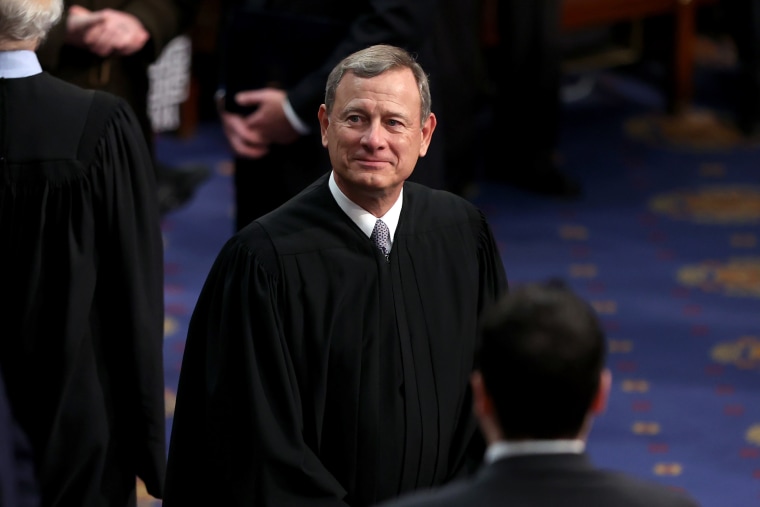As far as Supreme Court Chief Justice John Roberts is concerned, there’s no need for any kind of judicial reforms or changes to ethics laws. His colleagues and their institution, Roberts apparently believe, are just fine, and there’s no point in fixing a problem that doesn’t exist.
As an Associated Press report summarized this week, the high court and its justices are of the opinion that when it comes to ethics, “they will set their own rules and police themselves.”
There may have been a time when such a position was credible, but that time has since passed.
As we’ve discussed, Justice Clarence Thomas is facing an intensifying ethics mess that neither he nor his allies have been able to explain away. Another one of his far-right allies, Justice Neil Gorsuch, is now facing a separate ethics controversy of his own. Americans’ confidence in the high court, meanwhile, has reached depths unseen since the dawn of modern polling.
It was against this backdrop that Senate Judiciary Committee Chairman Dick Durbin invited Roberts to testify in early May about judicial ethics rules and potential reforms. The chief justice politely declined in a letter my MSNBC colleague Jordan Rubin described as “pathetic.”
It appears Roberts is simply hoping the political winds will shift direction, the headlines will fade, and the Supreme Court can go back to expressing indifference to the very idea of accountability.
For every Democratic member of the Senate Judiciary Committee, this isn’t good enough. NBC News reported yesterday:
Senate Judiciary Committee Chairman Dick Durbin and the panel’s other Democrats are calling on Chief Justice John Roberts to answer follow-up questions about ethics principles guiding the Supreme Court. The senators said in a letter to Roberts on Thursday that a statement of principles that he attached to a letter to the committee this week is insufficient on its own.
“The statement of principles raises more questions than it resolves, and we request that you respond to several key questions,” the letter read, adding that Roberts’ perspective could help the committee as it considers new legislation to address the justices’ ethical obligations.
The senators’ correspondence was not a perfunctory letter. Indeed, it’s worth reading if for no other reason than to appreciate just how serious the Democrats are about their concerns.
Since the chief justice is apparently reluctant to cross the street and testify, the Judiciary Committee members asked Roberts to answer a series of rather specific questions:
- On what date did the Justices subscribe to the Statement on Ethics Principles and Practices that you attached to your letter, and had the Justices subscribed to any previous statement of ethics principles and practices before that date? If so, please provide any such statement.
- The Statement on Ethics Principles and Practices notes that “[i]n 1991, Members of the Court voluntarily adopted a resolution to follow the substance of the Judicial Conference Regulations.” Does the Court currently require unanimity among the Justices in order to adopt a resolution to follow the substance of ethics regulations?
- The Statement on Ethics Principles and Practices provides that “Justices, like other federal judges, consult a wide variety of authorities to address specific ethical issues.” What guidance do Justices receive on which authorities to consult, and how is this consultation process and any final decision on a particular matter documented?
- The Statement on Ethics Principles and Practices provides that “[a]llegations of errors or omissions in the filing of financial disclosure reports are referred by the Secretary of the Judicial Conference to the Committee on Financial Disclosure. The Committee may send the filer a letter of inquiry, providing an opportunity for the filer to respond as appropriate.” What is the consequence, if any, for a sitting Justice who does not respond as appropriate to such a letter of inquiry?
- Has there ever been any censure, reprimand, admonition, sanction, or other penalty imposed on a Justice for failure to abide by any of the principles and practices now contained in the Statement on Ethics Principles and Practices? If so, what types of penalties have been, or may be, imposed? Is there a process by which the public may file, and the Supreme Court may receive, complaints that a Justice has failed to abide by these principles?
The senators requested that Roberts respond by May 1 — which is Monday — ahead of a scheduled hearing on Supreme Court ethics on May 2.
For good measure, Durbin and his colleagues also reminded Roberts that sitting justices “have testified before Senate or House Committees on at least 92 occasions since 1960.”
We’ll learn soon enough how and whether the chief justice responds, but in the meantime, Democratic Sen. Richard Blumenthal of Connecticut said Thomas’ controversy constitutes “potentially criminal“ misconduct, and the bipartisan bill that would require the U.S. Supreme Court to create its own code of conduct within a year now has a bill number and is already generating some notable conversation.
All of which is to say, if Roberts is waiting for the political world to lose interest in the high court’s troubles, he’ll apparently be waiting for quite a while.
This post revises our related earlier coverage.

